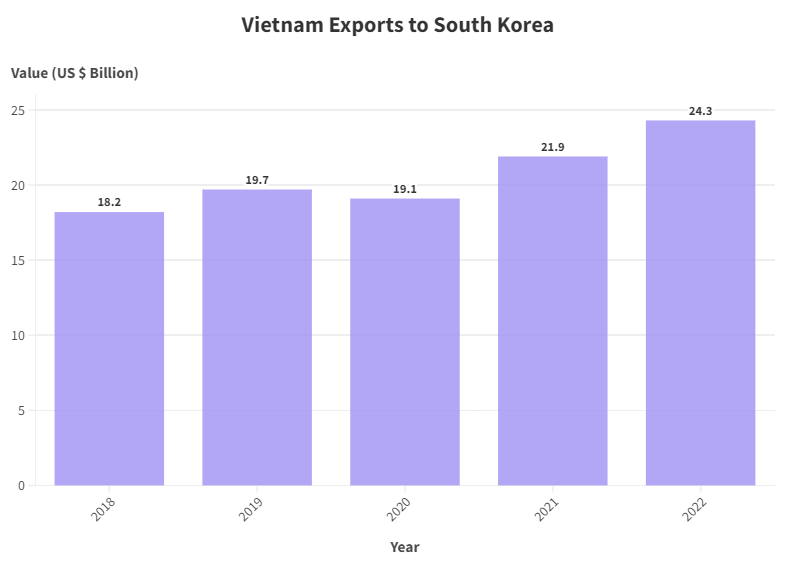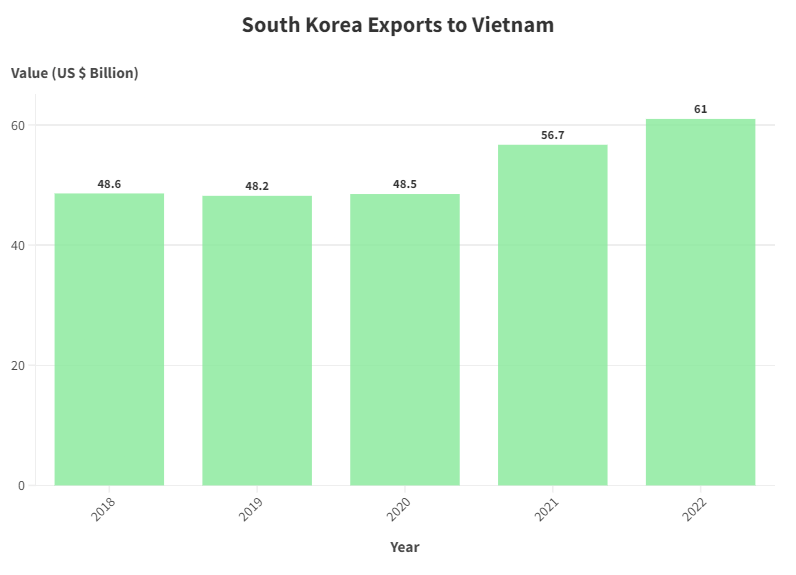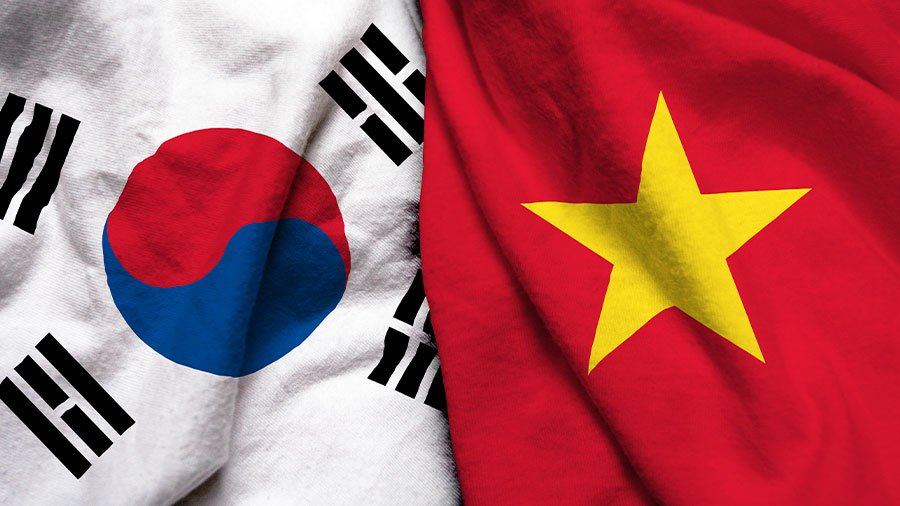In 2023, Vietnam remained South Korea’s third-largest trading partner for the second consecutive year despite a trade slowdown. Vietnam maintained its position above Japan.
Prime Minister Pham Minh Chinh visited South Korea from June 30 to July 3, 2024 to expand the scope of business activities for 10,000 Korean companies in Vietnam. The visit also promoted the development of industrial parks specializing in new energy, renewable industries, advanced technology and artificial intelligence.
Diplomatic relations
After the Cold War, South Korea and Vietnam normalized diplomatic ties on December 22, 1992. This was a move following Vietnam’s 1986 Doi Moi reforms, which aimed to end its isolation and foster global friendship. Since then, relations between the two countries have grown rapidly and steadily in various fields.
As strategic partners, the two countries cooperate in a range of key areas, including economy, defence, security, health and the environment, and are also expanding their cooperation on international challenges in the Indo-Pacific region and global geopolitical issues.
Bilateral Trade
Over the past decades, bilateral relations between Vietnam and South Korea have made great progress, with their diplomatic relations being elevated to a comprehensive strategic partnership in 2022. This strengthened partnership is reflected in the expansion of economic ties between the two countries, with total trade between the two countries increasing from US$2 billion in 2010 to US$86.5 billion in 2022. Vietnam and South Korea have committed to increasing bilateral trade to US$150 billion by 2030.
Find business support

Two-way trade is concentrated in machinery, electronics and transport equipment.
According to OEC data, Vietnam will export goods worth $15.8 billion to South Korea in 2022, with telephones ($2.93 billion), broadcasting equipment ($2.91 billion) and computers ($1.06 billion) as the main exports. This is a significant increase from $187 million in 2017, representing an annual growth rate of 143 percent.
According to World Bank data, South Korea’s machinery and electronics exports to Vietnam increased from 25.3% in 2010 to 62.6% in 2020. Similarly, Vietnam’s machinery and electronics exports to South Korea increased from 8.4% to 53.9% during the same period.
Top 5 exports from South Korea to Vietnam in 2022
|
Exports from South Korea to Vietnam |
Value (USD) |
|
Electrical and Electronic Equipment |
36.16 billion |
|
plastic |
3.9 billion |
|
Mineral fuels, oils and distillate products |
3.77 billion |
|
Machinery, reactors, boilers |
3.1 billion |
|
Vehicles other than trains and trams |
1.75 billion |
|
Source: Trading Economics |
|
Top 5 exports from Vietnam to South Korea in 2022
|
Exports from Vietnam to Korea |
Value (USD) |
|
Electrical and Electronic Equipment |
10.45 billion |
|
Machinery, reactors, boilers |
2.16 billion |
|
Clothing (not knitted or crocheted) |
2,090,000,000 |
|
Clothing (knitted or crocheted) |
1,090,000,000 |
|
Wood and wood products, charcoal |
865.17 million |
|
Source: Trading Economics |
|


According to OEC data, compared to May 2023, South Korea’s exports to Vietnam in May 2024 increased from $4.28 billion to $5.12 billion, a notable increase of $846 million (19.8%). Imports from Vietnam during the period increased by $118 million (6.13%), from $1.92 billion to $2.04 billion.
Find business support

The year-on-year increase in South Korea’s exports to Vietnam was mainly due to strong increases in exports of mineral fuels, mineral oils and products, perfumes and cosmetics, and fertilizers.
Similarly, South Korea’s increase in imports from Vietnam was mainly due to increased imports of non-knitted garment accessories, machinery, machinery tools, parts and footwear.
In May 2024, the main export items from South Korea to Vietnam are as follows:
- Electrical machinery and electronic equipment (US$2.28 billion)
- Mineral fuels, mineral oils and mineral products (US$294 million)
- Plastics and its products (US$224 million)
- Machinery, equipment and parts (US$213 million)
- Automobiles, tractors, trucks and parts (US$102 million)
The main imports from Vietnam to South Korea in May 2024 are as follows:
- Electrical machinery and electronic equipment (US$844 million)
- Machinery, equipment and parts (US$402 million)
- Non-knitted clothing accessories (US$252 million)
- Footwear (US$132 million)
- Knitted clothing accessories (US$131 million)
In the first half of 2024, total trade volume between Vietnam and South Korea reached US$38.4 billion, up significantly from the previous year. South Korea is Vietnam’s third-largest trading partner and second-largest import market, highlighting the importance of the economic ties between the two countries.
investment
South Korea remains an important investor in Vietnam, with total registered capital reaching US$87 billion. In the first half of 2024, direct investment from South Korea reached US$1.41 billion, up 15.8% year-on-year. This growth makes South Korea the fourth-largest investor among Vietnam’s 84 economies. In addition, South Korea is Vietnam’s third-largest export market.
Find business support

The Vietnamese government is encouraging Korean companies to expand their investments, especially in cutting-edge sectors such as advanced technology, electronics, semiconductors, AI, renewable energy and human resource development.
Samsung has a major presence in Vietnam with $22.4 billion in investment and 90,000 jobs, with 310 Vietnamese companies in its supply chain and 2,500 employees at its research and development center in Hanoi.
During his visit, PM Pham also discussed Vietnam’s electric vehicle sector with Hyundai Motor, which has invested more than $410 million in the country. He urged Hyundai to step up efforts in green transportation and incorporate more local suppliers into its supply chain, aiming to strengthen Vietnam’s domestic industry and improve its technological capabilities.
PM Pham also highlighted opportunities for urban sustainability and growth in the tourism sector, and invited Lotte Group to join Vietnam’s smart city development and sustainable tourism efforts.
Meanwhile, South Korea’s Hyosung Corp has revealed plans to expand its presence in Vietnam, including setting up a new data center in Ho Chi Minh City.
Bilateral Agreements
Through various bilateral agreements, Vietnam and South Korea have laid a solid foundation for strengthening economic cooperation through increased trade and investment flows.
Vietnam-Korea Free Trade Agreement
The Vietnam-Korea Free Trade Agreement (VKFTA), signed on May 5, 2015 and effective on December 20, 2015, strengthens economic cooperation between Vietnam and Korea and provides greater incentives than the ASEAN-Korea FTA (AKFTA). The agreement aims to promote trade, services, and investment without replacing the AKFTA. The VKFTA agreement clearly defines the rules of origin for goods, requires them to meet certain standards, and includes provisions for special goods and exemptions from the Certificate of Origin requirement for low-value imports.
The commitments on trade in services guarantee national treatment (NT) and most-favored nation (MFN) treatment, as well as additional sectoral opening compared to the WTO and AKFTA commitments. Investment protection includes NT and MFN treatment, dispute settlement mechanisms through administrative tribunals and arbitration.
Double Taxation Avoidance Agreement
The Double Taxation Avoidance Agreement (DTA) between Vietnam and South Korea plays an important role in promoting economic cooperation and investment between the two countries. The agreement provides clear guidelines on tax issues and prevents double taxation, creating a stable and predictable tax environment that benefits both countries and taxpayers.
The DTA came into force on September 11, 1994, and covers a wide range of tax-related matters to ensure that individuals and companies are not double taxed on the same income in both countries.
This agreement applies to residents of either Vietnam or South Korea, or both. It ensures that residents of these contracting states comply with the provisions of the agreement, which apply to all taxes on income levied by either country. Specifically, it includes:
- In the case of Vietnam: personal income tax, profit tax, profit remittance tax.
- In the case of South Korea: income tax, corporate tax and resident tax. The agreement also applies to identical or substantially similar taxes levied after the signing of the agreement.
Benefits of the contract:
- Avoiding double taxation: DTAs ensure that income earned in a country is not subject to double taxation, fostering a favorable investment climate.
- Tax certainty: The agreement provides clear rules and definitions, reducing uncertainty and potential disputes between tax authorities and taxpayers.
- Economic cooperation: The DTA will facilitate cross-border trade and investment by removing tax barriers, strengthening economic ties between Vietnam and South Korea.
- Preventing tax evasion: The agreement includes measures to prevent tax evasion and ensure that taxes are paid properly in the appropriate jurisdiction.
Comprehensive Strategic Partnership
In 2002, Vietnam and South Korea upgraded their relationship to a “21st Century Comprehensive Partnership”. This was further upgraded to a “Strategic Cooperative Partnership” in 2009, and most recently to a “Comprehensive Strategic Partnership” during Vietnamese President Nguyen Xuan Phuc’s visit to Seoul in December 2022.
The two countries have set a goal of increasing bilateral trade to US$100 billion by 2025 and US$150 billion by 2030.
The partnership makes South Korea the first middle power to enter into such a partnership with Vietnam. The upgrade reflects South Korea’s important role as a partner of Vietnam. Under the framework, the two countries aim to strengthen cooperation in maritime security, national defense and defense industry. Annual bilateral defense dialogue since 2012 and cooperation in maritime security and arms production are the main focuses.
Conclusion
Going forward, Vietnam and South Korea are poised to complement each other’s economic and industrial strengths and expand cooperation in cutting-edge areas such as sustainability, AI, renewable energy and smart cities. As the two countries navigate geopolitical complexities, the Vietnam-South Korea strategic relationship will be a stabilizing force, promoting mutual prosperity and contributing to regional development.
About us
Vietnam Briefing is published by Asia Briefing, a subsidiary of Desan Sira & Associates. We produce materials for foreign investors across Asia including ASEAN, China and India. For editorial enquiries please click here. For a free subscription to our products please click here. For support on investing in Vietnam please contact us here. vietnam@dezshira.com or translation:.
Dezan Shira & Associates supports foreign investors throughout Asia from offices around the world, including Hanoi, Ho Chi Minh City and Da Nang, as well as through offices and collaborative partners in China, Hong Kong SAR, Dubai (UAE), Indonesia, Singapore, Philippines, Malaysia, Thailand, Bangladesh, Italy, Germany, the United States and Australia.

